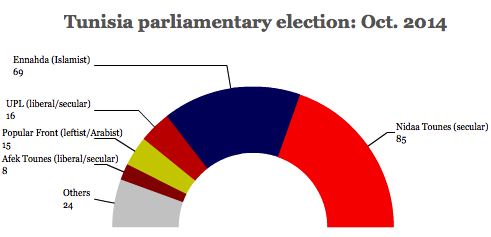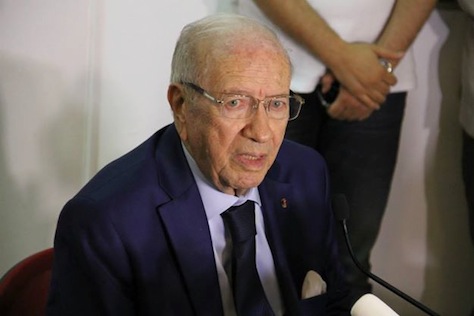Behind all the happy headlines ushering in the ‘secular victory’ in Tunisia’s Sunday parliamentary elections, there’s a darker possibility lurking.![]()
Tunisia’s newly constituted secular party, Nidaa Tounes (حركة نداء تونس, Call of Tunisia), narrowly defeated Tunisia’s Islamist party Ennahda (حركة النهضة) in the first regular parliamentary elections since the Arab Spring revolution that ousted former president Zine El Abidine Ben Ali. Official results announced hours ago confirmed the victory, which gives Nidaa Tounes a plurality, but not an outright majority, in Tunisia’s 217-member, unicameral parliament.
Under the new election law, 199 members of the assembly are elected across 33 single-member and multi-member constituencies, with 18 representatives elected from six overseas constituencies.
The risks of Ennahda are well-known to US and European policymakers, who have long doubted that Islamist movements can also be inclusive and democratic. Though Tunisia’s Islam is mild by the standards of the Arabian peninsula, the Levant and even neighboring Libya, secular Tunisians feared that Ennahda would overreach in the same way as the Muslim Brotherhood’s Mohammed Morsi in his one year as Egypt’s president, endangering the relatively liberal social climate that Tunisians enjoyed, even under the Ben Ali regime.
* * * * *
RELATED: How Tunisia became the success story of the Arab Spring
* * * * *
Those fears, despite a rise in violence from fundamentalist Islamists earlier this summer, were always overwrought. Ennahda, which won the first parliamentary elections to Tunisia’s post-Ben Ali constituent assembly in October 2011, has a much more mixed record in government. Tunisians are still unsatisfied about the state of the economy and, especially, unemployment three years after economic factors played a huge role in the protests that led to Ben Ali’s overthrow and kicked off the ‘Arab spring’ revolutions across the Muslim world.
But Ennahda, despite a political crisis that forced its government to resign in January 2014, nevertheless bridged Tunisia from the authoritarian Ben Ali era to the promulgation of a new constitution. In respect of Tunisia’s new democratic system, Ennahda leadership conceded victory, based on preliminary results released Monday.
Rachid al-Ghannouchi, who founded Ennahda in 1981, was a longtime champion of greater democracy in Tunisia, and he has always been painfully mindful of the political divisions that plunged neighboring Algeria into a civil war in the 1990s and the miscalculations of the Muslim Brotherhood in Egypt and the increasingly chaotic anarchy in neighboring Libya.
But in Nidaa Tounes, Tunisians have elected into government a patchwork alliance of liberals, labor unions and technocrats and officials with experience that goes back not just to the Ben Ali era, but to Tunisia’s first post-independence president, the long-serving Habib Bourguiba.
That brings another risk — that the rem ants of the Ben Ali and Bourguiba regimes could develop such a stranglehold on Tunisia’s governmental institutions that the country returns to the kind of de facto soft-authoritarian, if secular, state that preceded the spectacular January 2011 revolution that resulted in Ben Ali’s forced resignation.
Tunisian affairs tend toward moderation, among both the Islamist and secular camps. Even during the Bourguiba regime, Tunisia pushed forward with some of the most progressive rights within North Africa and the Middle East, especially as regards women’s rights. So while the prevailing sentiment after Tunisia’s elections should be relief that the vote took place with virtually no disruption, and that Ennahda quickly admitted defeat and indicated its intent to hand over power to Nidaa Tounes, there’s room for concern about the fragility of Tunisia’s nascent democracy.
No one personifies the ties to the old regime more than Beji Caid Essebsi, the Nidaa Tounes leader, who is also the frontrunner in the Tunisian presidential election set for November 23. Essebsi (pictured above), now age 87, was an advisor to Bourguiba from the first moments of Tunisia’s independence, and he served as the head of Bourguiba’s national police, interior minister and foreign minister, and he served in Tunisia’s parliament during the Ben Ali era. Continue reading Tunisian election results: the (secular) empire strikes back


